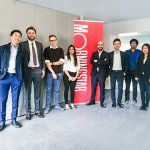By SMU Lee Kong Chian School of Business Social Media Team
While hiring managers and recruiters have long been deluged with job applications boasting degree credentials in business or commerce, there is a powerful CV differentiator on the rise—the master’s in management (MiM). A qualification that first gained popularity in Europe, the MiM has increasingly become a passport to a coveted spot at the conference table of top corporations in Asia. It is open to pre-experience candidates, and yet offers enough breadth and real-world training to provide a competitive edge.
Indeed, when Peng Yuanyuan graduated with a Bachelor of Commerce, Logistics and Supply Chain Management in 2014, she felt like she had merely scratched the surface of the business world.
“I found my knowledge was still too narrow with respect to understanding market trends, how businesses were founded, their sources of funding, how marketing creates brand awareness, and how human resource strategically shapes the organisation’s leadership and culture,” she says.
To deep dive into the nuances of the business world, and stand out in a crowded marketplace, she signed up for the Singapore Management University (SMU) Master of Science in Management (MiM) programme. This intensive 18-month postgraduate degree offered by the SMU Lee Kong Chian School of Business (LKCSB) covers a comprehensive range of business and management topics while also providing students with insights that will equip them for a broad variety of roles in the business world.
According to Yuanyuan, choosing SMU to further her studies was a straightforward decision. She found herself drawn to SMU’s unique pedagogy which emphasises the two-way exchange of thoughts and ideas between professors and students; the impressive physical campus and convenient location was another deciding factor.
It was a decision that turned out to be one of the best she’s made for personal growth, as the SMU MiM programme had helped her reach the goals she set out to achieve, and then some. When asked about the biggest takeaways from her experience, she highlights two sets of skills—project management and presentation skills.
“Every course we did in SMU MiM involved at least one group project and the deadlines were pretty close to one another. There were many ‘how-to’ challenges throughout the three terms like planning, assigning tasks among members based on strengths, and decision making,” she describes.
In fact, some of the biggest gains from the programme were more intangible. She initially had to overcome both psychological and linguistic barriers when it came to making presentations. However, “with regular practice, I am now able to speak confidently in front of people,” says the Chinese-born client advisor assistant at UBS.
Beyond these invaluable soft skills she gained, Yuanyuan also values the experience of networking with international peers and faculty and the priceless connections she gained as a result of attending the programme. After all, building lifelong interactions with similarly driven individuals from around the globe is a key focus at SMU, as such networks provide numerous professional opportunities that can be tapped throughout one’s career.
Since she completed the programme in 2015, Yuanyuan has found that the biggest gains of the 18-month programme were the real-world knowledge and communication skills she had developed which she now employs daily. The skillsets have indeed come in handy at her current job in wealth management in UBS. As a client advisor assistant, she discovered that it’s not just academic knowledge that helps her analysis of client portfolios.
“The lectures on corporate finance, for example, were not only based on material from textbooks, but also included anecdotes from the lecturer’s own personal banking experience. Some of the examples cited, such as the lecturer’s experience in managing clients in his investment banking career, served as useful case studies for me,” she says.
Ultimately, being a SMU MiM graduate has enabled Yuanyuan to create more value for her organisation and empowered her to become an assured and confident professional. By delivering a combination of hard, soft and “heart” (ethical and social responsibility) skills, the postgraduate programme has propelled her towards the successes she aspires and groomed her into becoming a leader of the future.
This article was originally published in the LKCBS Community.








